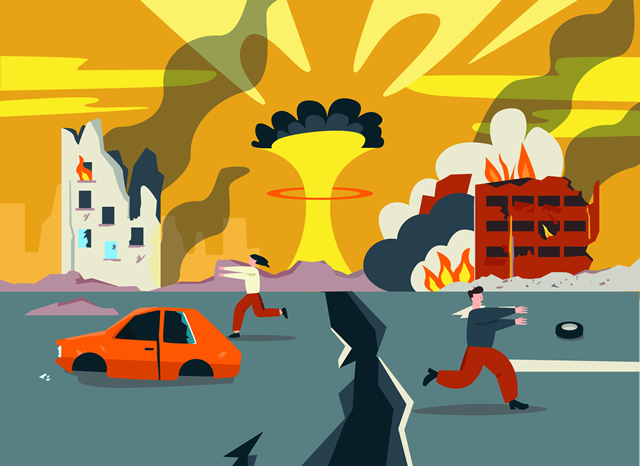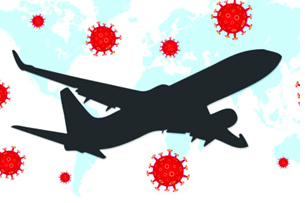
Covid Anxiety, Climate Panic, and Apocalypse Phobia: Part 1
People’s growing perplexity in the face of current crises was prophesied by Christ Himself. It is intensifying as His second coming approaches. An investigation.
In view of His second coming, the Lord Jesus announced: “And there will be signs in sun and moon and stars, and on earth distress of nations in perplexity because of the roaring of the sea and the waves, people fainting with fear and with foreboding of what is coming on the world. For the powers of the heavens will be shaken. And then they will see the Son of Man coming in a cloud with power and great glory” (Luke 21:25-27).
We’re not concerned with whether these words will be fulfilled before or after the Rapture. It’s much more important that we recognize the broader principles of recent times. These basic features of widespread fear and helplessness are crystallizing and becoming more and more noticeable the closer the end comes. Two scenarios are possible: on the one hand, this fear can be produced by people, either consciously or unconsciously. On the other hand, it can also reflect our powerlessness.
Our Lord speaks in Matthew 24:8 of the beginning of labor, in reference to events that precede and herald His coming. In this context there is talk of wars, rumors of war, unrest and uprisings, famines, epidemics, and earthquakes. But first, verse 5 mentions seduction. As far as I know, these labor pains begin before the Great Tribulation, peaking during that time.
In the midst of these mentioned events, our Lord says, “See that you are not alarmed” (Matt 24:6). Alarm is closely related to fear and anxiety. It is a global feature of recent times. For a woman giving birth, labor is also associated with fear.
In Luke 21, the Lord Jesus uses the term “fear” or “anxiety” (sunoché) to describe people’s attitude toward life. He speaks of “perplexity” or “helplessness” (aporia). Many translate this as “despair.” Yes, people will faint from fear (v. 26, apopsuchō). It refers to a terrible, existential fear of what’s to come.
Today, these things—reinforced by the coronavirus—range from small to large. On the small scale, new articles are constantly appearing about which things are unhealthy or harmful, or which signs of heart attack or cancer should be heeded. No one’s arguing against sober precautions. But some news providers highlight such things nearly every day. A great deal of emphasis is placed on nutrition and health, despite the fact that the West has food controls that are stricter than ever, as well as excellent medicine and scientific research compared to prior decades. Nevertheless, this fear arises constantly in our personal lives. If you were to take every tip into account, your day would be completely filled between self-diagnoses and creating a complex, healthy shopping list.
 And on the larger scale, just consider how much mental real estate and resources the climate crisis occupied prior to the coronavirus pandemic. When it comes to our environment and climate, there are plenty of forecasts and articles about a bleak future, and the (supposedly) very short timeframe that remains to reverse the trend. In the meantime, the climate issue is resurfacing despite coronavirus. There is also the fear of natural disasters and wars, fear of terrorist attacks on a previously unthought-of scale. Or consider the waves of fear that have swelled over the past twenty years, related to: BSE/Mad Cow Disease, SARS, Ebola, bird flu, swine flu, and now coronavirus. It isn’t my intention to downplay or belittle these concerns, but rather to show how fear and despair are rampant. Everything is interrelated. The coronavirus pandemic immediately led to panic reactions on the stock exchanges, and since then the global financial and economic system has been groaning tremendously. New gains can’t hide this.
And on the larger scale, just consider how much mental real estate and resources the climate crisis occupied prior to the coronavirus pandemic. When it comes to our environment and climate, there are plenty of forecasts and articles about a bleak future, and the (supposedly) very short timeframe that remains to reverse the trend. In the meantime, the climate issue is resurfacing despite coronavirus. There is also the fear of natural disasters and wars, fear of terrorist attacks on a previously unthought-of scale. Or consider the waves of fear that have swelled over the past twenty years, related to: BSE/Mad Cow Disease, SARS, Ebola, bird flu, swine flu, and now coronavirus. It isn’t my intention to downplay or belittle these concerns, but rather to show how fear and despair are rampant. Everything is interrelated. The coronavirus pandemic immediately led to panic reactions on the stock exchanges, and since then the global financial and economic system has been groaning tremendously. New gains can’t hide this.
Because of the Bible, we know that very different things are in store for this earth. We’re observing the fear and despair that are being stirred up, and the hysteria and panic that go along with it. In fact, you could read the following with the coronavirus pandemic in mind: “In a strategy paper published by the German Ministry of the Interior, ‘a worst case scenario’ should be staged in order to ‘achieve the desired shock effect,’ without actually ‘communicating the actual case mortality figures.’” Regardless of how dangerous the virus is, we can see how scare tactics are even consciously being taken into account as a “means to an end.” Do we even think about Mad Cow Disease anymore? I can still remember how the topic and its associated dangers were constantly in the media. But suddenly, there was silence on the issue, because another problem and a completely different real threat was on our doorstep: 9/11 and its aftermath, as well as the associated global terrorist threat. Will the coronavirus also take a back seat to newer events and the fears that accompany them? Or remember the tsunami that hit a highly developed, industrial nation in March 2011. Protective measures on the affected coasts of Japan proved ineffective, and fear of a far-reaching nuclear disaster kept mankind in suspense.
A few days after that tsunami, my wife and I were taking the train home from a business trip. Since we had to leave early in the morning, each of us were reading our Bibles. Suddenly, we were approached by another passenger who’d seen us reading. He asked whether Fukushima could be the Apocalypse from Revelation. A good conversation followed about faith and what will come in the end, even if the tsunami wasn’t what Revelation was referring to.
 Global digital media is not only increasing the flood of information, but also the fear and helplessness that this flood of information produces. The speed at which Covid-19 spread was only possible in a globalized world with considerable flight connections.
Global digital media is not only increasing the flood of information, but also the fear and helplessness that this flood of information produces. The speed at which Covid-19 spread was only possible in a globalized world with considerable flight connections.
The closer and more violent the contractions become, the more fear, helplessness, horror, and anxiety will spread…until the events of Luke 21 hit mankind, and the cosmic forces are shaken.
As Bible-believing Christians, we can also get scared. Even the Lord Jesus Himself was frightened in the Garden of Gethsemane. The Apostle Paul writes of how he was “afflicted” by both external struggles and internal fears (2 Cor 7:5); this from the same man who calls us not be anxious for anything (Phil 4:6). Our Lord confirmed to His disciples that they will face hardship and pressure in this world (John 16:33). But in all our fears, we can seek refuge in our Lord again and again, as the Psalmist says:
“God is our refuge and strength, a very present help in trouble. Therefore we will not fear though the earth gives way, though the mountains be moved into the heart of the sea, though its waters roar and foam, though the mountains tremble at its swelling” (Ps 46:1-3).
By contrast, the fear and the terror, the helplessness and the anxiety which Luke 21 speaks of, are a sign of humanity’s godlessness. It isn’t a matter of lack of religion, but of distance and alienation from the living God. Of course, even a Bible-believing Christian can be grasped or shaken by the fear of certain developments. Disasters and pandemics can hit us just as hard as anyone else. Yet the knowledge founded in God gives deep peace: we’re not helplessly at the mercy of our circumstances, but in the hands of the One who directs everything and has everything under control at all times. Through Christ, God is inseparable from His children, and will ultimately bring everything to its goal.
The fear that our Lord is speaking of in the Gospel of Luke is the fear that a godless man experiences. He thinks he has everything under control, until he notices that it’s all slipping from his grasp. He’s at the mercy of developments and events that he can no longer control. It’s understandable when some people become scared and anxious. But let’s not overlook the fact a hands-on and active God is excluded from any discussions of the climate and coronavirus. Man thinks he can solve any problem. But, regardless of whether today’s measures to protect against climate change or coronavirus are correct, everything will slip away from him in the end. This fear is also the impetus behind mindless and panic-driven actions.
A common slang phrase is, “It scared the living hell out of me.” That certainly sums up a human race and society that has pushed the living God more and more to the margins. When disasters occur, nobody sees God’s actions anymore, or bows before Him. Gerhard Maier writes in his commentary:
“Jesus clearly sees the ‘peoples’ of the end times as a unit. Even collectively, they are unable to remedy the situation. On the contrary: ‘They are in a state of perplexity with the roar and waves of the sea.’ In the original text, there is actually a single noun for ‘in a state of perplexity’: aporia, which has been adopted into English as well. Aporia as a sign of the second coming! Internationally unsolvable (or, hopeless) conundrums are already emerging: waste disposal, environmental pollution, growth in large cities, depletion of raw materials, limitation of water and air.”
Gerhard Maier wrote that more than 30 years ago. And we know that these problems haven’t decreased, but have grown larger since then. This also applies in the political arena. The collapse of communism in the Eastern Bloc didn’t mean the “end of history,” as American political scientist Fukuyama claimed. He said that the great ideological, economic, and political contradictions would be a thing of the past, and that humanity would experience a new era. Shortly afterward, he had to correct himself. Roughly 30 years later, everything looks very different. Consider the new tensions between world powers; war and chaos in the Middle East, North Africa, and other areas; as well as the rise of radical Islam and the associated terrorism. Also, the utterly excessive debt of industrialized nations is becoming an even bigger problem—and it’s rapidly worsening again due to the coronavirus and its associated measures.
It is this fear, despair, and hopelessness that ultimately drives people into the arms of the Antichrist, the apparent problem-solver. Therefore, as Bible-believing Christans, we must be careful not to let ourselves become infected: either by panic, or the false promises of salvation that are connected to it. As the Apostle Paul says:
“But since we belong to the day, let us be sober, having put on the breastplate of faith and love, and for a helmet the hope of salvation. For God has not destined us for wrath, but to obtain salvation through our Lord Jesus Christ, who died for us so that whether we are awake or asleep we might live with him. Therefore encourage one another and build one another up, just as you are doing” (1 Thess 5:8-11).
Midnight Call - 06/2021

